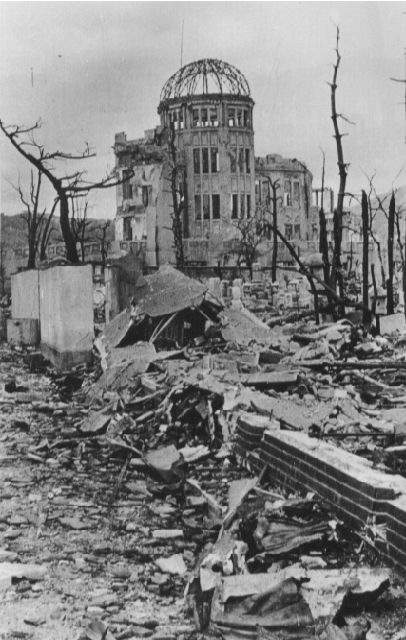Isn't It Time to Ban the Bomb?
Peace Action Board of Directors Co-chair Larry Wittner on History News Network
9-11-16
by Lawrence S. Wittner
Dr. Lawrence Wittner (http://www.lawrenceswittner.com) is Professor of History emeritus at SUNY/Albany. His latest book is a satirical novel about university corporatization and rebellion, What’s Going On at UAardvark?
 Although the mass media failed to report it, a landmark event occurred recently in connection with resolving the long-discussed problem of what to do about nuclear weapons. On August 19, 2016, a UN committee, the innocuously-named Open-Ended Working Group, voted to recommend to the UN General Assembly that it mandate the opening of negotiations in 2017 on a treaty to ban them.
Although the mass media failed to report it, a landmark event occurred recently in connection with resolving the long-discussed problem of what to do about nuclear weapons. On August 19, 2016, a UN committee, the innocuously-named Open-Ended Working Group, voted to recommend to the UN General Assembly that it mandate the opening of negotiations in 2017 on a treaty to ban them.
For most people, this recommendation makes a lot of sense. Nuclear weapons are the most destructive devices ever created. If they are used―as two of them were used in 1945 to annihilate the populations of Hiroshima and Nagasaki―the more than 15,000 nuclear weapons currently in existence would destroy the world. Given their enormous blast, fire, and radioactivity, their explosion would bring an end to virtually all life on earth. The few human survivors would be left to wander, slowly and painfully, in a charred, radioactive wasteland. Even the explosion of a small number of nuclear weapons through war, terrorism, or accident would constitute a catastrophe of unprecedented magnitude.
Every President of the United States since 1945, from Harry Truman to Barack Obama, has warned the world of the horrors of nuclear war. Even Ronald Reagan―perhaps the most military-minded among them―declared again and again: “A nuclear war cannot be won and must never be fought.”
Fortunately, there is no technical problem in disposing of nuclear weapons. Through negotiated treaties and unilateral action, nuclear disarmament, with verification, has already taken place quite successfully, eliminating roughly 55,000 nuclear weapons of the 70,000 in existence at the height of the Cold War.
Also, the world’s other agents of mass destruction, biological and chemical weapons, have already been banned by international agreements.
Naturally, then, most people think that creating a nuclear weapons-free world is a good idea. A 2008 poll in 21 nations around the globe found that 76 percent of respondents favored an international agreement for the elimination of all nuclear weapons and only 16 percent opposed it. This included 77 percent of the respondents in the United States.
But government officials from the nine nuclear-armed nations are inclined to view nuclear weapons―or at least their nuclear weapons―quite differently. For centuries, competing nations have leaned heavily upon military might to secure what they consider their “national interests.” Not surprisingly, then, national leaders have gravitated toward developing powerful military forces, armed with the most powerful weaponry. The fact that, with the advent of nuclear weapons, this traditional behavior has become counter-productive has only begun to penetrate their consciousness, usually helped along on such occasions by massive public pressure.
Consequently, officials of the superpowers and assorted wannabes, while paying lip service to nuclear disarmament, continue to regard it as a risky project. They are much more comfortable with maintaining nuclear arsenals and preparing for nuclear war. Thus, by signing the nuclear Non-proliferation Treaty of 1968, officials from the nuclear powers pledged to “pursue negotiations in good faith on . . . a treaty on general and complete disarmament under strict and effective international control.” And today, nearly a half-century later, they have yet to begin negotiations on such a treaty. Instead, they are currently launching yet another round in the nuclear arms race. The U.S. government alone is planning to spend $1 trillion over the next 30 years to refurbish its entire nuclear weapons production complex, as well as to build new air-, sea-, and ground-launched nuclear weapons.
Of course, this enormous expenditure―plus the ongoing danger of nuclear disaster―could provide statesmen with a powerful incentive to end 71 years of playing with their doomsday weapons and, instead, get down to the business of finally ending the grim prospect of nuclear annihilation. In short, they could follow the lead of the UN committee and actually negotiate a ban on nuclear weapons as the first step toward abolishing them.
But, to judge from what happened in the UN Open-Ended Working Group, a negotiated nuclear weapons ban is not likely to occur. Uneasy about what might emerge from the committee’s deliberations, the nuclear powers pointedly boycotted them. Moreover, the final vote in that committee on pursuing negotiations for a ban was 68 in favor and 22 opposed, with 13 abstentions. The strong majority in favor of negotiations was comprised of African, Latin American, Caribbean, Southeast Asian, and Pacific nations, with several European nations joining them. The minority came primarily from nations under the nuclear umbrellas of the superpowers. Consequently, the same split seems likely to occur in the UN General Assembly, where the nuclear powers will do everything possible to head off UN action.
Overall, then, there is a growing division between the nuclear powers and their dependent allies, on the one hand, and a larger group of nations, fed up with the repeated evasions of the nuclear powers in dealing with the nuclear disaster that threatens to engulf the world. In this contest, the nuclear powers have the advantage, for, when all is said and done, they have the option of clinging to their nuclear weapons, even if that means ignoring a treaty adopted by a clear majority of nations around the world. Only an unusually firm stand by the non-nuclear nations, coupled with an uprising by an aroused public, seems likely to awaken the officials of the nuclear powers from their long sleepwalk toward catastrophe.
– See more at: http://historynewsnetwork.org/article/163730#sthash.hjOKEKYR.dpuf




